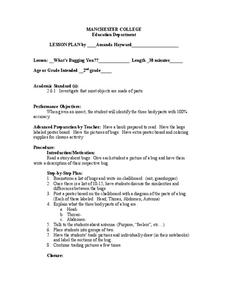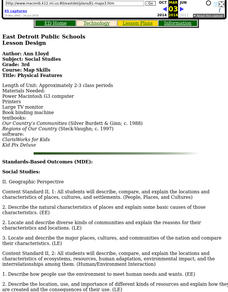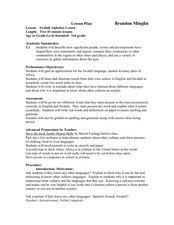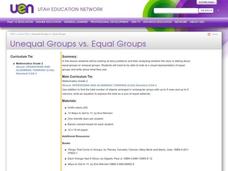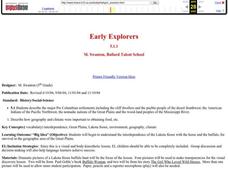Curated OER
What's Bugging You?
Second graders investigate insects. In this parts of a whole, 2nd graders discuss what the three body parts of an insect are as well as the antenna. Students create their own insect labeling each body part and antenna.
Curated OER
Physical Features
Students draw physical land features using ClarisWorks or Kid Pix, write their definitions, create slideshow, and create class geography book.
Curated OER
Arctic/Antarctic Animals
Fourth graders explore animals of the Arctic and Antarctic and then create a report. They become aware of the great diversity among animals.
Curated OER
So You Want To Be A...
Students design Career Character Poster, research occupations of interest, write about their future career choices, and present a first-person narrative about their chosen occupation.
Curated OER
The Journey to Civil Rights
Students explore several significant figures and events of the Civil Rights Movement and sequence the key events to create a timeline. The lesson utilizes the story, "The Story of Ruby Bridges," the work of Robert Coles to introduce the...
Curated OER
Marine & Aquatic Habitats Activities - Creatures in the Coral
Young scholars describe unique adaptations of organisms that live in the coral reef habitat, read various books pertaining to coral reefs and ocean life, and construct a wheel demonstrating the relationships between certain coral reef...
Alabama Learning Exchange
Nocturnal Animals Lesson #4: Owls
Students investigate the owl food chain. They discuss owl facts, explore various websites, dissect an owl pellet, create a picture of the owl food chain, read the book, "Owl Babies," and write an owl poem.
Curated OER
Author Study: Laura Ingalls Wilder
Students read novel, Little House in the Big Woods, explore web sites and other resources devoted to author, Laura Ingalls Wilder, complete Venn Diagram showing ways they and author are alike and different, and create diorama, read...
Curated OER
Hooray For Heroes
Students identify and interpret what heroes are by researching various American heroes of the past. Students select several school heroes and interview them, as well as their own personal hero and write a story about them. Students...
Curated OER
Tall Tales
Students examine the characteristics of tall tales and how exaggerations are used. They create a character that is larger than life, they brainstorm attributes for their character, before writing a Tall Tale. They plan out their story,...
Curated OER
Cell Types and Parts
Eighth graders, after creating a Venn Diagram comparing/contrasting animal and plant cells, writing ten similes describing cell types, or drawing a colored diagram of a cell, list cell types as well as describe and label cell parts. They...
Curated OER
Guidebook
Students create a guidebook page about a plant on the school grounds. In this life and plant science lesson plan, students identify plants around the school, then research the plant and write a narrative about it. Students publish the...
Curated OER
Publisher Brochures
Students create brochures on subjects they are studying in Publisher. For this nonfiction writing lesson, students use Publisher to create a brochure telling all the main ideas of a topic they are studying. Students use text boxes, fonts...
Curated OER
The Froggy Page
Students investigate the cycle of life by observing tadpoles. In this biology lesson, students utilize the Internet to read stories, observe pictures, and listen to sounds of frogs. Students create a poster board collage...
Curated OER
Explore the Ocean
Students explore the oceans from their origin. In this oceans lesson, students read and discuss excerpts from the Book of Genesis regarding the creation of the ocean. Students then clean up a mock oil spill, measure the volume and area...
Curated OER
Let the Phone Get Them Talking! Using the Yellow Pages as a Teaching Resource
Students categorize information in the Yellow Pages. In this Let the Phone Book Get Them Talking! lesson, students find pictures in the Yellow Pages and thus gain a better understanding of how the book is organized. Students locate local...
Curated OER
Swahili Alphabet Lesson
Third graders learn about other cultures. In this Swahili lesson, 3rd graders discuss if they know any other languages, read the book Jambo Means Hello, discuss why it is important to learn about other cultures, learn a few words...
Curated OER
Rural Voices Through Photography
Students research the history of the Depression particularly in the ways it was documented by photography. Then they take their own pictures in the style of one of the best documentarians, Dorothea Lange.
Curated OER
Endangered Species
Students define extinction, name four animals and two plant species that are extinct, list three reasons why animals and plants become extinct, and create ways that would help prevent extinction.
Curated OER
DIVISION OF LABOR
Students define division of labor. They read books about how things are produced to help illustrate the concept of division of labor. They suggest other items that could illustrate division of labor. They create a sample flow chart...
Curated OER
Unequal Groups vs. Equal Groups
Third graders read and discuss math story problems and analyze if the story is using equal groups or unequal groups. They listen to the book "12 Ways To Get to 11," and simulate the story using beads on a pipe cleaner. Students then...
Curated OER
Early Explorers
Fifth graders examine how the environment and climate affected Pre-Colombian settlements. For this civilization lesson, 5th graders view pictures of different Native American tribes in different places and discuss how different groups...
Curated OER
Growth of a River
Students evaluate geography by drawing an image in class. In this river lesson, students identify a list of vocabulary terms associated with bodies of water. Students identify how a river is formed and draw a picture of one including the...
Curated OER
Edward Lear, Limericks, and Nonsense: There Once Was...
Students recognize poetic devices including rhyme, syllabification, and meter. They identify the characteristics of a nonsense poem and of a limerick. They write their own limericks.
